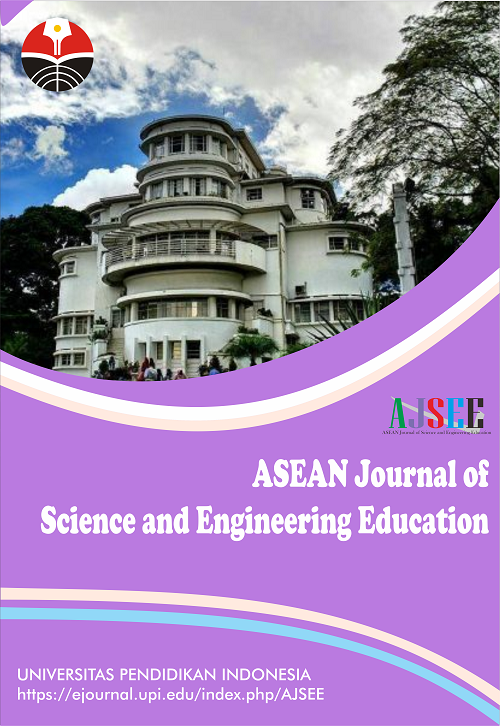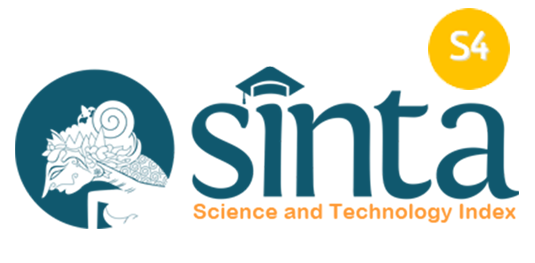Primary Educators Experts’ Validation of The Developed Mathematics Mobile Application to Enhance the Teaching of Mathematics in Nigeria Primary Schools
Abstract
Keywords
Full Text:
PDFReferences
Aris, N., and Orcos, L.(2015). ICT and school education. International Journal of Interaction Multimedia and Artificial Intelligence, 3(4), 13-16.
Benidiktus, T., Rully, C. I., and Jeinne, M. (2017). Mathematics instruction, problems, challenges and opportunities: a case study in Manokwari Regency, Indonesia. World Transactions on Engineering and Technology Education, 15(3), 287-291.
Bindu, C. (2016). Impact of ICT on teaching and learning: A Literature review. International Journal of Management and Commerce Innovations I, 4(1), 24-31.
Bingimlas, K. A. (2017). Barriers to the successful integration of ict in teaching and learning environments: A Review of the literature. Eurasia Journal of Mathematics, Science and Technology Education, 5(3), 235-245.
Dickel, A. D., and Denis, A. T. (2018). Effects of metacognitive scaffolding on the mathematics performance of grade 6 pupils in a cooperative learning environment. International Journal of English and Education, 7(4), 378.
Franklin, T. (2011). Mobile learning: At the tipping point. TOJET: The Turkish Online Journal of Educational Technology, 10(4), 261-275.
Hassan, M., Hamdan, Z., and Al-sadi, J. (2012). A new mobile learning content design process. International Journal of Academic Research, 4(1), 23-28.
Hwang, G. J., and Chang, H. F. (2011). A formative assessment-based mobile learning approach to improving the learning attitudes and achievements of students. Computers and Education, 56(4), 1023-1031.
Keengwe, J., and Maxfield, M. (2015). Advancing higher education with mobile learning technologies: Cases, trends and inquiry-based methods. Hershey, PA: IGI Global, 3(1), 73-79.
Korucu, A. T., and Bicer, H. (2018). Investigation of post-graduate Students' attitudes towards Mobile learning and opinions on mobile learning. International Technology and Education Journal, 2(1), 21-34.
Korucu, A., and Alkan, A. (2011). Differences between m-learning (mobile learning) and e-learning, basic terminology and usage of m-learning in education. Procedia - Social and Behavioral Sciences, 15(4) 1925-1930.
Lowenthal, J. N. (2010). Using mobile learning: Determinates impacting behavioral intention. American Journal of Distance Education, 24(4), 195-206.
Martin, F., and Ertzberger, J. (2013). Here and now mobile learning: An experimental study on the use of mobile technology. Computers and Education, 68, 76-85.
Mehdipour, Y., and Zerehkafi, H. (2013). Mobile learning for education: Benefits and challenges. International Journal of Computational Engineering Research, 3(6), 93-101.
Park, Y. (2011). A pedagogical framework for mobile learning: categorizing educational applications of mobile technologies into four types. The International Review of Research in Open and Distributed Learning, 12(2), 78–102.
Pollara, P., and Broussard, K. (2011). Student perceptions of mobile learning: A review of current research. Society for Information Technology and Teacher Education International Conference, 20(3), 1643-1650.
Raja, R., and Nagasubramani, P. C. (2018). Impact of modern technology in education. Journal of Applied and Advanced Research, 3(1), 33-35.
Sarkar, S. (2012). The role of information and communication technology (ICT) in higher education for the 21st century. Science, 1(1), 30-41.
Taleb, Z., and Sohrabi, A. (2012). Learning on the move: The use of mobile technology to support learning for university students. Procedia-Social and Behavioral Sciences, 69, 1102-1109.
Traxler, J. (2009). Learning in a mobile age. International Journal of Mobile and Blended Learning (IJMBL), 1(1), 1-12.
Valk, J., Rashid, A. T., and Elder, L. (2010). Using mobile phones to improve educational outcomes: An analysis of evidence from Asia. International Review of Research in Open and Distance Learning, 11(1), 117-140.
Wu, W. H., Wu, Y. C., Chen, C. Y., Kao, H. Y., Lin, C. H., and Huang, S. H. (2012). Review of trends from mobile learning studies: A meta-analysis. Computers and Education, 59(2), 817-827.
Wurst, C., Smarkola, C., and Gaffney, M. A. (2008). Ubiquitous laptop usage in higher education: Effects on student achievement, student satisfaction, and constructivist measures in honors and traditional classrooms. Computers and Education, 51(4), 1766-1783.
Yusuf, M. O. (2005). Information and communication technology and education: Analysing the Nigerian national policy for information technology. International Education Journal, 6(3), 316-321.
DOI: https://doi.org/10.17509/ajsee.v1i3.38505
Refbacks
Copyright (c) 1970 Universitas Pendidikan Indonesia

This work is licensed under a Creative Commons Attribution-ShareAlike 4.0 International License.














